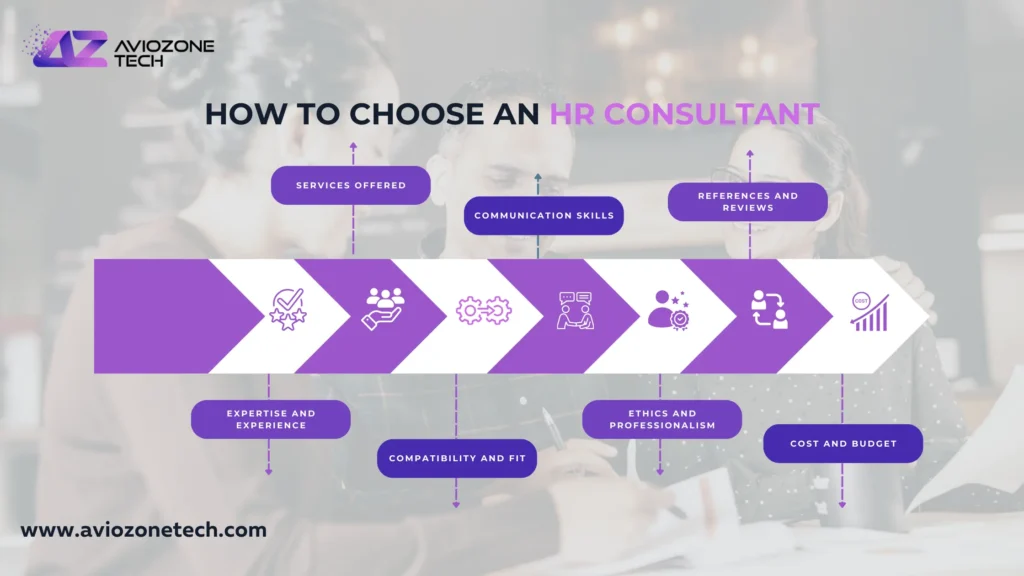Why HR Consulting is Important for Businesses: Best Guide
Human Resources (HR) consulting plays an important role in guiding companies toward success. Beyond just hiring and paying employees, HR consultants ensure that businesses follow rules, resolve employee issues effectively and plan for the future workforce.
In today environment where change is constant. HR consultants act as essential advisors, helping businesses maintain strength and create a supportive work environment. Their expertise enables companies to maximize their potential and foster growth. Join me as we explore why HR consulting is indispensable for businesses.
What is an HR Consultant?
An HR consultant is a professional who provides expert advice and support to organizations on various human resources matters. Their role typically involves helping businesses improve their HR functions, policies, and practices to enhance overall efficiency, employee satisfaction, and compliance with employment laws.
HR consultants may specialize in areas such as recruitment and selection, employee relations, performance management, compensation and benefits, training and development, HR strategy or organizational development.
They work closely with management teams and HR departments to analyze current practices, identify areas for improvement and develop and implement solutions tailored to the organization specific needs.
Consultants may also assist with specific projects like restructuring, mergers and acquisitions, or developing HR policies and handbooks. They bring a depth of knowledge and experience from working with different clients and industries, offering valuable insights and best practices to address HR challenges effectively.
Overall, HR consultants play a crucial role in helping businesses optimize their human capital and create a positive and productive work environment.
Why HR Consulting is Important for Businesses

Human Resources (HR) consulting has become increasingly essential for businesses of all sizes and industries. From strategic planning to compliance and employee relations, HR consultants play a pivotal role in helping organizations navigate complex HR challenges and achieve their business goals effectively. Lets explore why HR consulting is crucial and how it benefits businesses.
1. Expertise and Specialization
HR consultants bring deep expertise and specialized knowledge in various HR disciplines. Whether its recruitment, compensation and benefits, performance management, or employee development, consultants offer insights and strategies that align HR practices with the organization overall objectives.
Their specialized knowledge ensures businesses can implement best practices and optimize HR processes for maximum efficiency.
2. Cost Efficiency
For small and medium-sized enterprises (SMEs), maintaining a full-fledged HR department can be costly and impractical. HR consulting provides a cost-effective alternative by allowing businesses to access expert HR services on a flexible basis.
This arrangement saves costs associated with hiring full-time HR staff, including salaries, benefits, training, and overhead expenses, while still receiving high-quality HR support.
3. Strategic Guidance and Alignment
HR consultants contribute to the strategic direction of the organization by aligning HR initiatives with business goals. They assist in developing HR strategies that support growth, expansion into new markets, or organizational restructuring.
By aligning HR practices with strategic objectives, consultants help businesses achieve greater operational efficiency and competitive advantage.
4. Compliance and Risk Management
Navigating labor laws, regulations, and compliance requirements can be daunting for businesses. HR consultants stay abreast of legislative changes and ensure that company policies and practices comply with legal standards.
This proactive approach minimizes legal risks, penalties, and potential lawsuits, safeguarding the organization reputation and financial stability.
5. Recruitment and Talent Management
Attracting and retaining top talent is crucial for business success. HR consultants assist in developing effective recruitment strategies, conducting talent searches, and implementing robust selection processes to identify the best candidates.
They also advise on talent management practices, including onboarding, training, and career development, to enhance employee engagement and retention rates.
6. Employee Development and Performance
Investing in employee development is key to maintaining a skilled and motivated workforce. HR consultants design training programs, performance management systems, and employee feedback mechanisms that foster professional growth and improve individual and team performance.
By enhancing employee skills and competencies, businesses can achieve higher productivity and innovation.
7. Conflict Resolution and Employee Relations
Maintaining positive employee relations and resolving conflicts promptly are critical for a harmonious workplace environment. HR consultants possess expertise in conflict resolution techniques, mediation, and fostering open communication channels.
They help mitigate workplace disputes, promote a culture of respect and collaboration, and strengthen employee morale and loyalty.
8. Adaptation to Change
In today rapidly evolving business landscape, organizations must adapt quickly to market changes, technological advancements, and economic shifts. HR consultants assist businesses in implementing agile HR strategies, organizational restructuring, and change management initiatives.
By fostering a culture of flexibility and resilience, consultants enable businesses to navigate uncertainties and seize new opportunities effectively.
9. Benchmarking and Best Practices
HR consultants bring industry insights, benchmarks, and best practices to the table. They analyze market trends, competitor practices, and industry benchmarks to identify opportunities for improvement in HR processes and policies. By adopting proven strategies and benchmarks, businesses can enhance operational efficiency, employee satisfaction, and overall performance.
10. Focus on Core Business Activities
Outsourcing HR functions to consultants allows businesses to focus on core competencies and strategic priorities.
By delegating HR responsibilities to experts, organizations can allocate resources more efficiently to activities such as product development, sales, customer service, and innovation. This strategic focus enhances overall productivity, profitability, and business growth.
Responsibilities of HR Consultants
HR consultants have various responsibilities depending on their specific role and the needs of the organization they are supporting.
Here are some common responsibilities of HR consultants:
Strategic Planning:
Collaborating with management to align HR strategies with overall business goals. This involves understanding the organization’s objectives and providing HR solutions that support them.
Recruitment and Selection:
Assisting in the recruitment process by sourcing candidates, screening resumes, conducting interviews, and coordinating hiring activities. HR consultants often advise on best practices for attracting and retaining talent.
Employee Relations:
Handling employee relations issues such as grievances, conflicts, and disciplinary actions. They may provide guidance to managers on resolving issues and ensuring compliance with employment laws and company policies.
Performance Management:
Developing and implementing performance management systems, including goal-setting, performance reviews, and feedback mechanisms. HR consultants may train managers on performance evaluation techniques and help identify areas for improvement.
Training and Development:
Assessing training needs within the organization and designing training programs to enhance employee skills and knowledge. This could include leadership development, technical training, and soft skills workshops.
Compensation and Benefits:
Analyzing compensation structures and benefits packages to ensure competitiveness within the industry and compliance with regulations. HR consultants may conduct salary surveys, benchmarking, and recommend changes to compensation strategies.
HR Policies and Procedures:
Developing and updating HR policies, procedures, and employee handbooks. They ensure policies are clear, fair, and aligned with legal requirements and organizational culture.
Compliance and Legal Issues:
Staying informed about labor laws, regulations, and industry trends to ensure the organization complies with all legal requirements. HR consultants may advise on legal matters related to employment, discrimination, and workplace safety.
Organizational Development:
Facilitating organizational change initiatives, such as restructuring, mergers, or acquisitions. HR consultants may assist in managing transitions, communicating changes to employees, and maintaining morale during transitions.
HR Analytics and Reporting:
Using data analytics to provide insights into HR metrics such as turnover rates, recruitment effectiveness, and employee engagement. HR consultants analyze data to make informed decisions and recommendations for improving HR processes.
How to Choose an HR Consultant

Here are 7 important factors to consider when choosing an HR consultant:
Expertise and Experience:
It’s crucial to select an HR consultant who possesses extensive expertise and experience in human resources management. Look for consultants who have a proven track record of handling similar challenges and projects within your industry. Their knowledge should encompass areas such as employee relations, compliance, recruitment, training and organizational development.
Services Offered:
Define the specific HR services you require assistance with. Ensure that the consultant offers these services and has the necessary expertise to deliver them effectively.
Whether you need strategic HR planning, policy development, performance management systems or HR technology implementation, the consultant should have a clear capability in these areas.
Compatibility and Fit:
Evaluate how well the HR consultant will fit into your organization’s culture and dynamics. They should be able to collaborate effectively with your team and understand the unique challenges and goals of your organization. A good fit ensures smoother integration and implementation of HR initiatives.
Communication Skills:
Effective communication is fundamental in any consultant-client relationship. The HR consultant should possess strong communication skills, both verbal and written. They should be able to articulate ideas clearly, listen actively to your concerns, and engage constructively with stakeholders at all levels of your organization.
References and Reviews:
Before making a decision, check references provided by the consultant. Speak with previous clients to understand their experience and satisfaction levels with the consultant’s services. Additionally, look for reviews or testimonials online to gather insights into the consultant’s reputation and performance.
Ethics and Professionalism:
Ensure that the HR consultant adheres to high ethical standards and maintains professionalism in all aspects of their work.
This includes maintaining confidentiality, handling sensitive information appropriately, and avoiding conflicts of interest that could compromise their objectivity.
Cost and Budget:
Consider your budget and the consultants pricing structure. Understand what is included in their fees and whether there are any additional costs for travel, materials, or extra services. While cost shouldnt, be the sole determining factor, its important to find a consultant whose fees align with your financial resources and expectations.
Also check: Mastering Stress and Work-Life Balance in the Workplace
Conclusion
In conclusion, HR consulting is instrumental in helping businesses optimize HR functions, achieve compliance, enhance employee relations, and drive strategic growth.
By leveraging the expertise of HR consultants, organizations can navigate complexities, mitigate risks and capitalize on opportunities in todays competitive marketplace. Investing in HR consulting not only improves operational efficiency but also positions businesses for sustained success and resilience in an ever-changing business environment.
FAQs
HR is crucial to businesses as it manages talent acquisition, development, and retention. They directly impacting productivity, innovation and organizational success.
HR consulting offers expert guidance to optimize HR functions, improve workforce management, and align strategies with business goals.
The top HR consulting firm offers strategic guidance for optimizing HR practices, from recruitment to compliance, boosting efficiency and aligning with your business goals.







